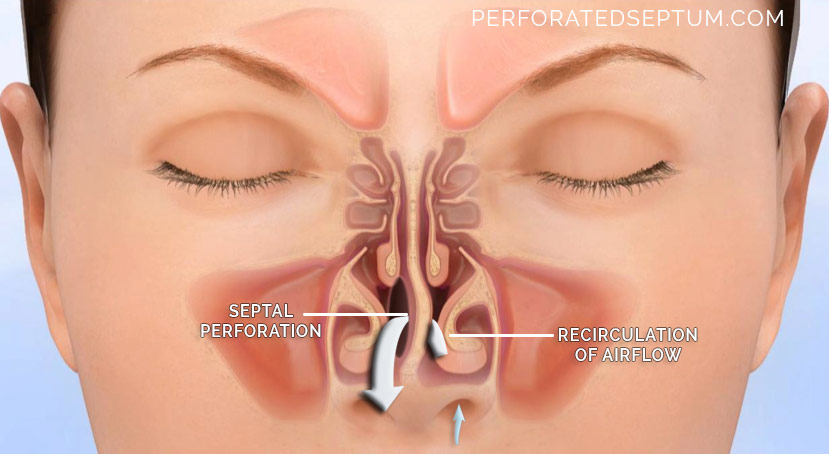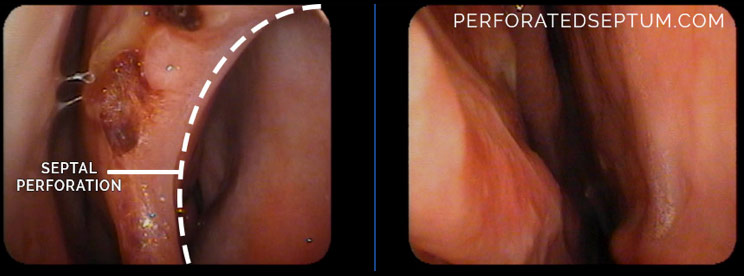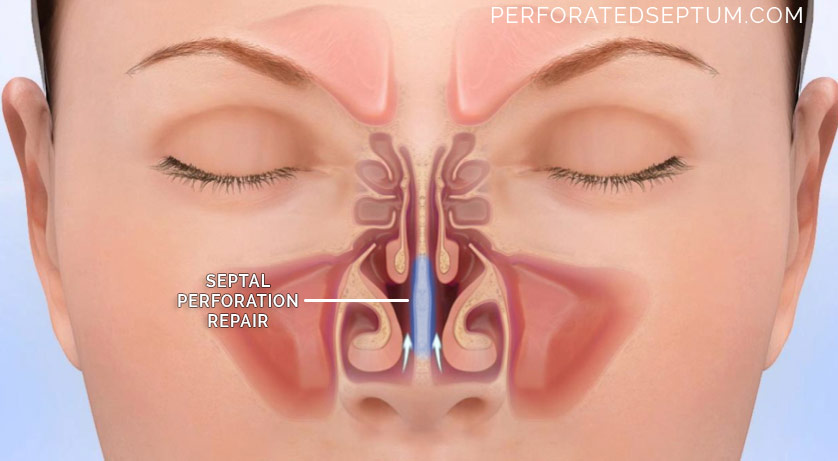
Chistina Huffington recently wrote about her struggles with cocaine addiction and recovery. Cocaine is a commonly abused drug and it seems stories surface regularly about another person who is caught by addiction to cocaine. Cory Monteith, is also attempting recovery from addiction and Whitney Houston’s autopsy report showed damage due to cocaine use. Addiction is a lifelong, serious struggle and often, even in the face of “knowing better,” the addict is unable to stop abusing their substance of choice.
Cocaine addiction is troubling for many reasons but one of the most significant long-term effects that even a recovered addict faces is the damage done to the nose. This occurs because one of the most common ways of consuming cocaine is by sniffing it through the nose. The blood vessels in the nose are close to the surface and can rapidly absorb the drug into the body, giving the desired high quickly. However, this is the same reason so much damage can be done to the nose.

Figure 1. Perforated septum is a hole in the nasal septum that cause excessive drying of the nasal passages leading to nosebleeds, infections, foul smelling odors, and nasal collapse.
What nasal injuries does cocaine cause?
The nose is a much more complicated organ that it would seem to be. Damage to the nose from cocaine can cause:
- Epistaxis (nosebleed)
- Infections
- Perforated septum (hole in the nasal septum)
- Collapse of the nose
- Loss of sense of smell

Figure 2. The perforated septum weakens the nasal septum eventually causing collapse of the nose.
Why do these injuries occur?
The nose is very delicate, with fragile blood vessels located very close to the outside. The septum, in particular, is prone to injuries. There are blood vessels in the lining of the septum; cocaine causes these blood vessels to constrict (close down). When the blood vessels constrict, the blood supply to the lining of the nose does not get enough oxygen. When the oxygen supply drops, the lining begins to die. Once the lining dies, it can no longer support the cartilage underneath it and it, too, dies. This causes a septal perforation (hole in the septum).
Once the septum is perforated, the nose can collapse because the septum is the structural support of the nose.
Lack of oxygen will also injure the lining, so that it is more prone to infection. When the lining is damaged, it will break down, causing nosebleeds.
Can these injuries be treated?
The most important thing in the treatment of nasal injuries is stopping the use of cocaine. This allows the blood vessels to recover, which will allow the lining to recover. However, once a septal perforation occurs, stopping cocaine alone will not make it resolve. The hole in the septum will be prone to infection and will naturally get bigger over time. This can affect the appearance of the nose, producing what is called a “saddle nose.” The voice may also be affected, with audible whistling through the perforation and an altered nasal resonance.

Figure 3a, 3b. Septal perforation (left) showing crusting, dry blood and a large opening through the nasal septum. Perforated septum repair (right) showing complete closure of the perforated septal defect with no evidence of disease.

Figure 4. Septal perforation repair showing restoration of normal airflow.
It is important to seek treatment before the perforation gets so large as to cause a saddle nose. Treatment is complex and should be done only by a surgeon with extensive experience in nasal reconstruction.
To learn more about Dr. Jason Hamilton and septal perforation treatment, please click here.
